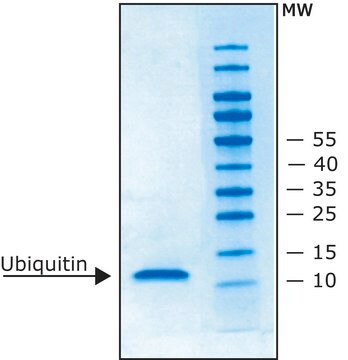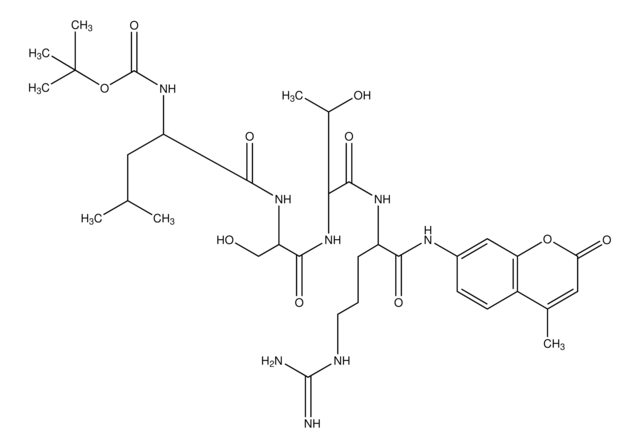SRP6522
Ubiquitin-TAMRA-labeled (TMR-Ub)
≥95% (SDS-PAGE)
Synonym(s):
CEP80, HUBCEP80, RPS27A, Ribosomal Protein S27a, UBA80, UBB, UBCEP1, UBCEP80
Sign Into View Organizational & Contract Pricing
All Photos(1)
About This Item
UNSPSC Code:
12352200
NACRES:
NA.32
Recommended Products
Assay
≥95% (SDS-PAGE)
form
liquid
mol wt
9.133 kDa
packaging
pkg of 50 μg
concentration
8 mg/mL
shipped in
dry ice
storage temp.
−70°C
General description
Post-translational modification of proteins by ubiquitin (Ub) is a key regulatory process that impacts almost all cellular functions. Ubiquitylation occurs through isopeptide linkage between the C-terminus of Ub and the e-amino group of a lysine (Lys) residue on the target substrate [1]. Ub itself has seven Lys residues (6, 11, 27, 29, 33, 48, and 63), any of which can participate in further ubiquitylation, generating polyUb chains [2, 3]. Monitoring the ubiquitylation of target proteins or the growth of polyubiquitin chains has traditionally been carried out with either radiolabeled or epitope-tagged ubiquitin requiring long and laborious detection methods. Fluorescently labeled ubiquitin provides a rapid, facile technique for studying ubiquitin conjugation in vitro. Unlike others, TheTAMRA-labeled ubiquitin carries a single TAMRA molecule attached at a defined location and avoids modification of either the N-terminus or Lys side chains.
Physical form
≥ 8 mg/mL in PBS.
Storage Class Code
13 - Non Combustible Solids
WGK
WGK 3
Flash Point(F)
Not applicable
Flash Point(C)
Not applicable
Choose from one of the most recent versions:
Certificates of Analysis (COA)
Lot/Batch Number
Sorry, we don't have COAs for this product available online at this time.
If you need assistance, please contact Customer Support.
Already Own This Product?
Find documentation for the products that you have recently purchased in the Document Library.
Our team of scientists has experience in all areas of research including Life Science, Material Science, Chemical Synthesis, Chromatography, Analytical and many others.
Contact Technical Service








